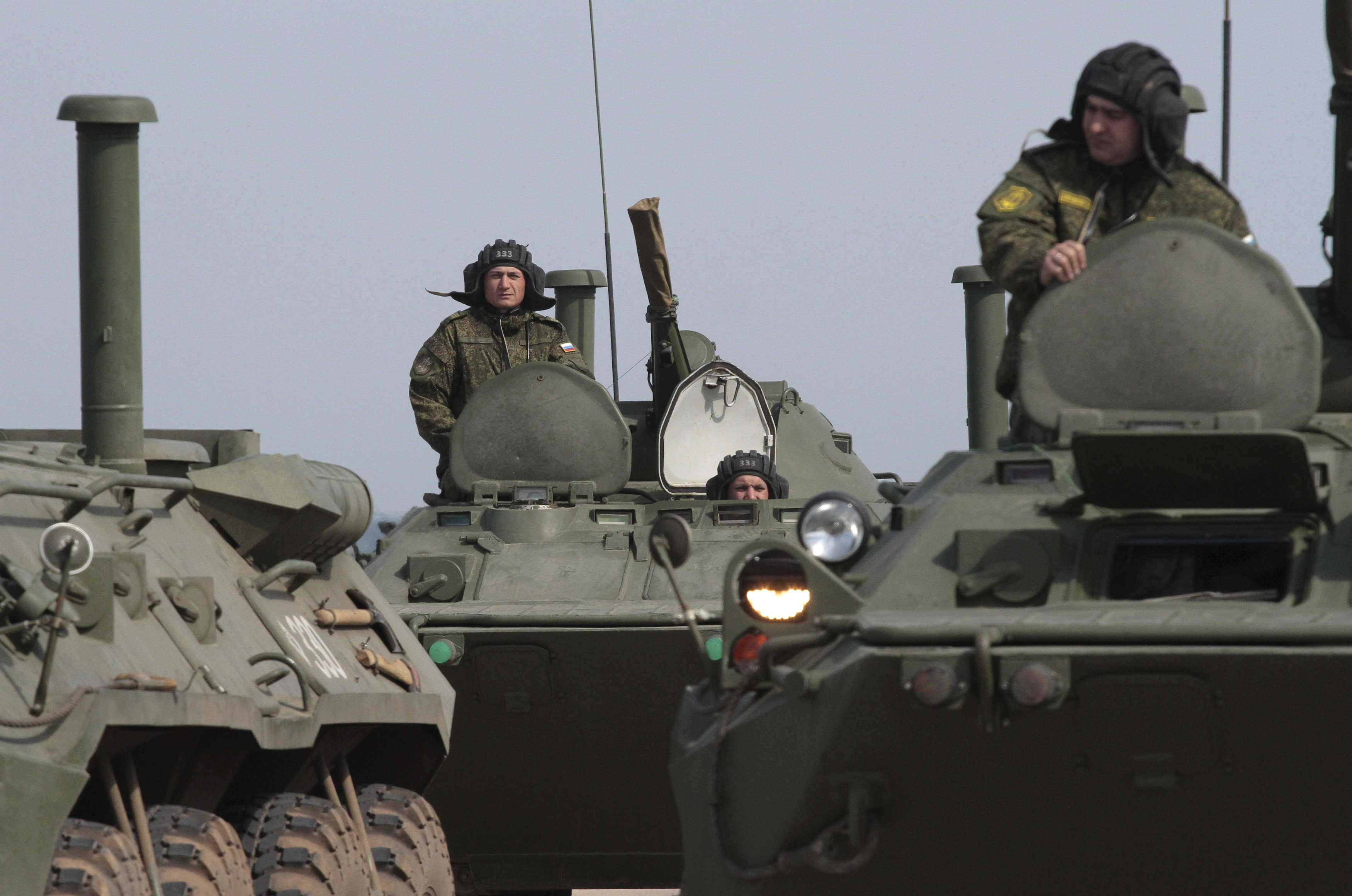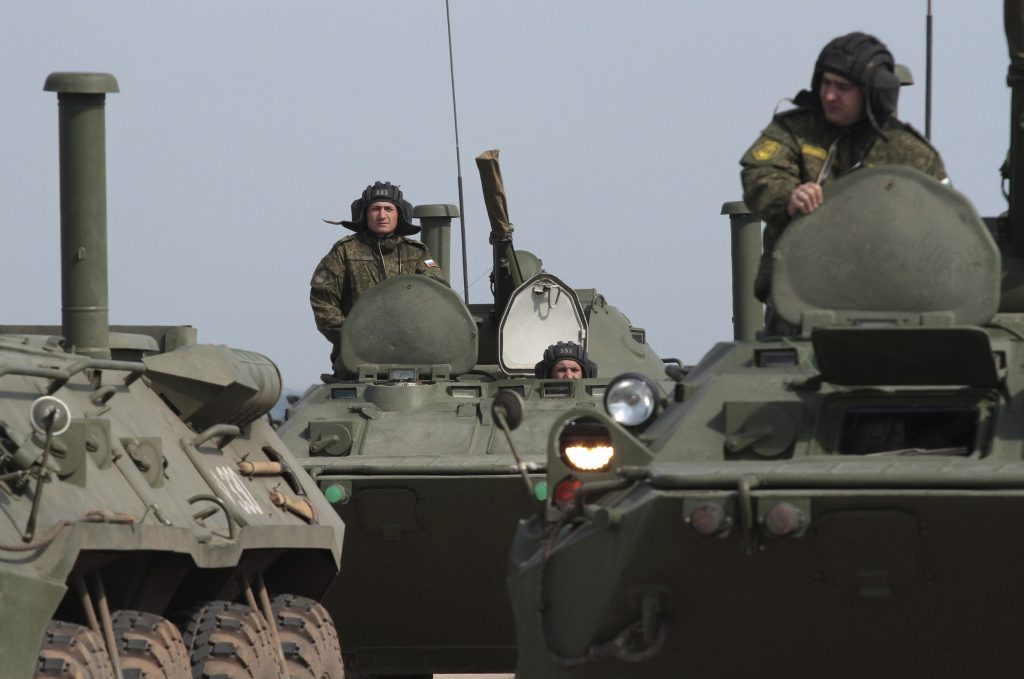 The presence of “strategic and moral clarity” in Washington is essential before a reset in the US-Russia relationship can be attempted, John E. Herbst, director of the Atlantic Council’s Dinu Patriciu Eurasia Center and a former US ambassador to Ukraine, said in Washington on March 28.
The presence of “strategic and moral clarity” in Washington is essential before a reset in the US-Russia relationship can be attempted, John E. Herbst, director of the Atlantic Council’s Dinu Patriciu Eurasia Center and a former US ambassador to Ukraine, said in Washington on March 28.
US President Donald J. Trump has expressed a desire for renewed relations with the Kremlin.
Once the Trump administration has “produced polices that will stop [Russia] from further aggression and limit their danger” it can then “engage them in areas of mutual interest,” such as fighting Islamic extremism, said Herbst.
Herbst gave opening remarks at an Atlantic Council event after which he was joined by Alexander Golts, a visiting fellow at the Kennan Institute of the Woodrow Wilson International Center for Scholars; and retired Brig. Gen. Peter Zwack, a senior Russia-Eurasia fellow at the Institute of National Strategic Studies of the National Defense University, to discuss Russia’s military presence in Ukraine and Syria. Ariel Cohen, a nonresident senior fellow at the Atlantic Council’s Dinu Patriciu Eurasia Center, moderated the conversation.
Transparency between the Kremlin and the White House would allow for the sharing of information and intelligence, and some degree of trust between the countries, said Zwack.
There is no alternative to having “some form of credible conduits between key military, defense, and political leadership between [Russia and the United States] short of war. And the state of those conduits today are less than they were during the height of the Cold War,” Zwack said.
According to Zwack, increased communication could provide clearer rules of engagement between the two countries.
He recommended a “dual-track” Russia policy. “First and foremost is that we protect our allies” and “support our partners” while maintaining our “morals, ethics, and beliefs,” he said. “Within that framework, where we can, pragmatically, we try to bridge with the Russians” to “push back on their negative behaviors,” he added.
“But the heart of all of this… we have a system and structure” of allies, said Zwack, “Russia does not have that.”
Herbst noted that the threat posed by Russian President Vladimir Putin’s leadership, particularly his military operations in Ukraine and Syria, are unsustainable and must be countered by the West.
“NATO and the US are much stronger than Russia, and if we pursue the right, sober, but strong policies, we can manage the danger that Russia represents. [Putin’s] victories have come because the West has been sleeping,” said Herbst.
“What we need now is a strong forward defense in Ukraine by providing much more military assistance,” said Herbst. Doing so would make Russia “much less likely to create problems in the Baltic States,” he added.
At the Warsaw Summit in 2016, NATO “took strong steps toward deployments in the East—in the Baltic States, Poland, and Romania—which I think put us on a good course to manage the Russian danger to NATO,” according to Herbst.
He also believes we are “seeing the high-water mark of Russian-Iranian cooperation” in Syria. Both Tehran and Moscow are “animated strongly by antipathy towards the United States,” Herbst said. Should regime change occur in either country, the “basis for their close cooperation will diminish substantially,” Herbst continued, and Russian power projection in the Middle East may decrease.
Russia, alongside Iran, have provided military support to President Bashar al-Assad’s embattled regime in the Syrian war since 2015. Russia, Syria, Iran, and Turkey have been the main actors in the Syrian peace talks, which began on January 23. Still, human rights violations in Syria continue to be cause for concern as reports of war crimes and civilian casualties mount.
The Kremlin also has a hand in Crimea, which remains under Russian occupation. Russia annexed the territory shortly after the Ukrainian revolution of 2014, which resulted in power shifting from former Ukrainian President Viktor Yanukovych to the new, freely elected President Petro Poroshenko.
“The main goal” of the Russian operation in Syria is to “overcome isolation because of [the] Crimean crisis,” pushing the United States to increase diplomatic interaction with Russia, and to fight against revolutions globally, according to Golts.
However, the conflict in Ukraine has led to “full-scale confrontation with the West,” said Golts, a confrontation that cannot be resolved with small amounts of Russian “ground brigades.”
“Now, in order to answer the challenge of war against a global adversary, Russian armed forces are returning to mass mobilization concept,” said Golts.
While the Kremlin’s modernization, military upgrades, and increased capabilities are important, “the United States’ ability to project power militarily” and through soft power “is still the most powerful in the world today,” said Zwack.
Golts said that the greatest success of Russian armed forces occurred on Feb. 26, 2014, when Putin announced a combat readiness inspection. In two days, approximately 40,000 Russian soldiers were deployed along the Russian-Ukrainian border. “In 1999, it took three full weeks before [the] first paratroop battalion was deployed in Dagestan,” said Golts.
However, these units were “not ready for occupation or long-term battle,” but rather they were prepared for “local conflicts only,” said Golts. All potential “higher stages of conflict” could be solved only with the “help of nuclear weapons,” he continued.
Zwack pointed out that approximately one-third of the Russian military are one-year conscripts, which creates military challenges in both defending borders and commitments abroad. Russian reliance on conscripts also creates a disincentive to engage in dangerous military action abroad, at least in the eyes of the public, Golts explained.
Additionally, Golts expressed skepticism of Russian military equipment upgrades. The Russian economy, which in 2014 suffered from what Zwack called a “trifecta” of collapsed oil prices, high inflation, and sanctions, in addition to a decreased defense budget in 2016, restricts full implementation of new Russian military technology.
Compounding these issues, “corruption is corroding every good part in the Russian economy, including areas that are directly affecting the military industrial complex,” such as the Russian space industry, which requires much of the same materials as intercontinental ballistic missiles (ICBMs), Cohen said.
In the current circumstances, robust Russian presences in Egypt, Libya, and the Pacific will be very difficult for the Kremlin to maintain, according to Zwack.
However, engagement in Syria showed how Russia could focus their efforts to create a strategically significant and “very well executed” operation from a military perspective, Zwack said.
Jack Gloss is a communications intern at the Atlantic Council.
Image: Russian servicemen drive armoured vehicles as they take part in a rehearsal for the Victory Day military parade April 16 in the Crimean port of Sevastopol. Russia will celebrate the 70th anniversary of the victory over Nazi Germany in World War II in May. (Reuters/Pavel Rebrov)

